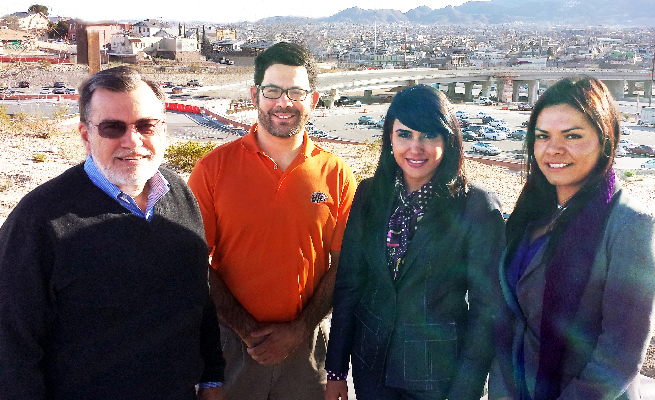Originally published February 27, 2015
By Daniel Perez
UTEP News Service
The recent violence in Juárez, Mexico, has put a strain on the capabilities of mental health professionals in that city, so a research team from The University of Texas at El Paso conducted a study to define the problem and offer solutions.
Paul Carrola, Ph.D., assistant professor of educational psychology and special services, and his team interviewed approximately 25 counselors in Juárez in November and December 2014. The study covered training, resources and supervision and also investigated the effect of secondary trauma (the reaction of those who hear firsthand trauma experiences) on counselors and the general impact to the quality of their lives from burnout.

Carrola, a licensed professional counselor from San Antonio, Texas, said one of the reasons he pursued a position at UTEP was to continue his research into counselor burnout, which he described as “frustration from a lack of strategies and techniques to assist clients, and emotional exhaustion from high client caseloads.” Counselors often experience stress, headaches, stomach pains and fatigue due to burnout and secondary trauma.
His interest in Juárez was based on the city once being dubbed “the world’s most violent city” because of the drug cartel conflict that raged hottest from 2006-12 when more than 11,000 Juarenses were killed, including 3,000 in 2010. On top of that, counselors had to deal with machismo-fueled instances of domestic violence.
The initial data showed that counselors, who in Mexico can earn their licenses with only a bachelor’s degree, bemoaned a lack of enhanced training. The study also found that counselors, their agencies, and the universities that train them would like to collaborate with UTEP to gain greater insights into best practices. Carrola said he hoped to organize workshops, collaborations and training programs at UTEP or sites in Juárez that would give counselors additional strategies to better serve themselves and their clients.
“There’s no magic that will solve the problem,” said Carrola, who advised counselors to balance a formula of nutrition, exercise, rest and recreation. “It will take a combination of all the existing tools in the right measure at the right time to combat burnout. If you don’t take care of yourself, you won’t be able to provide the best help for your clients and you will eventually break down.”
Carrola’s study is original and important work, said Irma Guadalupe Casas Franco, director general of the Casa Amiga Crisis Center in Juárez. Casas said the research results will give educators and administrators better options to address burnout factors.
“Considering that it is an issue that is being experienced by different groups that work in the Paso del Norte (region), it is important to know the burnout levels in order to generate policies focused on working from an interdisciplinary perspective with professionals that deal with daily social interactions,” Casas said.
Among the researchers was Elizabeth Lugo, a master’s student in counseling at UTEP who was a licensed counselor in Juárez for four years until 2012 when she became emotionally exhausted from wave after wave of sessions with people of all ages describing the violence they experienced. She realized that she needed more training to better serve her clients.
“This is my way to contribute,” Lugo said referring to the research that she predicted would lead to new opportunities for besieged mental health professionals. “It has to be done. The only question is by whom.”
Monica Gomez said she saw the study’s academic and personal value. Gomez, who earned her bachelor’s degree in bilingual education from UTEP in 2006, is a master’s student in counseling and another member of Carrola’s research team.
She taught in elementary schools in low-income neighborhoods in El Paso and Dallas, and had to deal with students whose families were victims of cartel or domestic violence.
“We feel a binational connection to this situation,” said Gomez, a former Juarense who still has family there. “Our families are experiencing problems and we want to help.”
Richard Williams, Ph.D., associate professor of educational psychology and special services and director of UTEP’s Counseling Lab, is a co-principal investigator. He served as a consultant and is studying how to expand the research, develop workshops and teaching modules, and use the data to promote collaboration and establish long-term goals.
“We will develop training modules that will serve the teachers and answer the needs of the students,” Williams said.
The data from Carrola’s research will offer valuable insights over time, said Gerald Juhnke, Ed.D., professor of counseling at UT San Antonio, who has known and collaborated with Carrola for more than 10 years.
Juhnke said counselors who suffer from burnout because of secondary trauma may settle for a false new normal of lives in peril when it comes to treating victims or witnesses to violence. As for counseling students, Juhnke said Carrola’s research will make them more aware of the negative impact of counselor burnout.
“Stereotypical counselors often take care of everyone else, but not themselves,” Juhnke said. “Carrola’s work will help students understand that they must take care of themselves not only physically but emotionally as well.”
Carrola’s study recently was added to UTEP’s University Research Incentive Program. He plans to use those funds to continue his investigation into counselor burnout and organize workshops that inform and support mental health counselors.